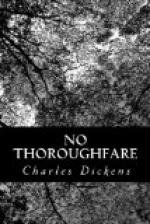The bells ring gaily in the little town of Brieg, and flags are stretched across the street, and rifle shots are heard, and sounding music from brass instruments. Streamer-decorated casks of wine have been rolled out under a gay awning in the public way before the Inn, and there will be free feasting and revelry. What with bells and banners, draperies hanging from windows, explosion of gunpowder, and reverberation of brass music, the little town of Brieg is all in a flutter, like the hearts of its simple people.
It was a stormy night last night, and the mountains are covered with snow. But the sun is bright to-day, the sweet air is fresh, the tin spires of the little town of Brieg are burnished silver, and the Alps are ranges of far-off white cloud in a deep blue sky.
The primitive people of the little town of Brieg have built a greenwood arch across the street, under which the newly married pair shall pass in triumph from the church. It is inscribed, on that side, “HONOUR AND LOVE TO MARGUERITE VENDALE!” for the people are proud of her to enthusiasm. This greeting of the bride under her new name is affectionately meant as a surprise, and therefore the arrangement has been made that she, unconscious why, shall be taken to the church by a tortuous back way. A scheme not difficult to carry into execution in the crooked little town of Brieg.
So, all things are in readiness, and they are to go and come on foot. Assembled in the Inn’s best chamber, festively adorned, are the bride and bridegroom, the Neuchatel notary, the London lawyer, Madame Dor, and a certain large mysterious Englishman, popularly known as Monsieur Zhoe-Ladelle. And behold Madame Dor, arrayed in a spotless pair of gloves of her own, with no hand in the air, but both hands clasped round the neck of the bride; to embrace whom Madame Dor has turned her broad back on the company, consistent to the last.
“Forgive me, my beautiful,” pleads Madame Dor, “for that I ever was his she-cat!”
“She-cat, Madame Dor?
“Engaged to sit watching my so charming mouse,” are the explanatory words of Madame Dor, delivered with a penitential sob.
“Why, you were our best friend! George, dearest, tell Madame Dor. Was she not our best friend?”
“Undoubtedly, darling. What should we have done without her?”
“You are both so generous,” cries Madame Dor, accepting consolation, and immediately relapsing. “But I commenced as a she-cat.”
“Ah! But like the cat in the fairy-story, good Madame Dor,” says Vendale, saluting her cheek, “you were a true woman. And, being a true woman, the sympathy of your heart was with true love.”
“I don’t wish to deprive Madame Dor of her share in the embraces that are going on,” Mr. Bintrey puts in, watch in hand, “and I don’t presume to offer any objection to your having got yourselves mixed together, in the corner there, like the three Graces. I merely remark that I think it’s time we were moving. What are your sentiments on that subject, Mr. Ladle?”




